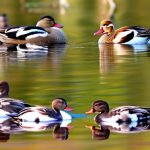The Nova Scotia Duck Tolling Retriever, also known as the Toller, is a medium-sized breed that originated in the early 19th century in the Little River District of Yarmouth County, Nova Scotia, Canada. The breed was developed to toll, lure, and retrieve waterfowl. The Toller’s unique hunting style involves playing and frolicking along the shoreline to attract the attention of ducks, hence the name “tolling.” Once the ducks are lured within range, the Toller retrieves them for the hunter. This breed is known for its intelligence, agility, and high energy level, making it an excellent hunting companion.
The Toller’s ancestry can be traced back to various breeds, including the Chesapeake Bay Retriever, Cocker Spaniel, and possibly the Golden Retriever and Irish Setter. The breed was officially recognized by the Canadian Kennel Club in 1945 and by the American Kennel Club in 2003. Today, the Nova Scotia Duck Tolling Retriever is not only a skilled hunting dog but also a beloved family pet and versatile working dog in various canine sports and activities.
The history of the Nova Scotia Duck Tolling Retriever is rich and fascinating, with its roots deeply embedded in the maritime culture of Canada. This breed’s unique hunting technique and versatile abilities have made it a cherished companion for hunters and families alike.
Table of Contents
- 1 What to Look for in a Nova Scotia Duck Tolling Retriever Breeder
- 2 The Importance of Health Testing in Nova Scotia Duck Tolling Retrievers
- 3 Finding a Reputable Nova Scotia Duck Tolling Retriever Breeder in Virginia
- 4 Questions to Ask a Nova Scotia Duck Tolling Retriever Breeder
- 5 The Process of Adopting a Nova Scotia Duck Tolling Retriever from a Breeder
- 6 Resources for Nova Scotia Duck Tolling Retriever Owners in Virginia
- 7 FAQs
- 7.1 What is a Nova Scotia Duck Tolling Retriever?
- 7.2 What should I look for in a Nova Scotia Duck Tolling Retriever breeder in Virginia?
- 7.3 How can I find a Nova Scotia Duck Tolling Retriever breeder in Virginia?
- 7.4 What should I ask a Nova Scotia Duck Tolling Retriever breeder in Virginia?
- 7.5 What health considerations should I be aware of when getting a Nova Scotia Duck Tolling Retriever from a breeder in Virginia?
Key Takeaways
- The Nova Scotia Duck Tolling Retriever originated in the early 19th century in Nova Scotia, Canada, where they were bred to lure and retrieve waterfowl.
- When looking for a Nova Scotia Duck Tolling Retriever breeder, it’s important to find one who prioritizes health testing and socialization of their puppies.
- Health testing is crucial in Nova Scotia Duck Tolling Retrievers to ensure they are free from genetic diseases and have a clean bill of health.
- Virginia residents looking for a reputable Nova Scotia Duck Tolling Retriever breeder can find one through local breed clubs, referrals, and online research.
- Prospective buyers should ask Nova Scotia Duck Tolling Retriever breeders about health testing, socialization, and the lineage of the puppies before making a decision.
- The adoption process for a Nova Scotia Duck Tolling Retriever from a breeder involves filling out an application, meeting the puppies, and potentially being placed on a waiting list.
- Nova Scotia Duck Tolling Retriever owners in Virginia can find resources such as local breed clubs, training facilities, and veterinarians to help care for their dogs.
What to Look for in a Nova Scotia Duck Tolling Retriever Breeder
When looking for a Nova Scotia Duck Tolling Retriever breeder, there are several key factors to consider to ensure that you are getting a healthy and well-bred puppy. First and foremost, it is essential to find a breeder who is dedicated to preserving the breed’s standard and working abilities. A reputable breeder will be knowledgeable about the breed’s history, characteristics, and health considerations.
Additionally, a responsible breeder will prioritize the health and well-being of their dogs and puppies. They will conduct health screenings for genetic conditions that are common in the breed, such as hip dysplasia, progressive retinal atrophy, and autoimmune thyroiditis. A good breeder will also be transparent about the health history of their breeding dogs and provide health clearances from recognized veterinary organizations.
Furthermore, a reputable breeder will prioritize proper socialization and early training for their puppies. They will provide a clean and stimulating environment for the puppies to grow and develop, as well as introduce them to various stimuli to ensure they are well-adjusted and confident. It is also important to find a breeder who is committed to supporting their puppy buyers throughout the dog’s life, offering guidance and resources for training, health care, and overall well-being.
The Importance of Health Testing in Nova Scotia Duck Tolling Retrievers
Health testing is crucial in ensuring the long-term well-being of Nova Scotia Duck Tolling Retrievers. Like all breeds, Tollers are susceptible to certain genetic conditions that can impact their quality of life. Responsible breeders prioritize health testing to identify and mitigate these potential health concerns in their breeding dogs.
Common health screenings for Tollers include hip evaluations to assess for hip dysplasia, ophthalmologist evaluations to check for eye conditions such as progressive retinal atrophy, and thyroid testing to screen for autoimmune thyroiditis. Additionally, some breeders may also conduct genetic testing for other hereditary conditions that are prevalent in the breed.
By conducting thorough health testing on their breeding dogs, responsible breeders can make informed decisions to improve the overall health of the Toller population. This proactive approach helps reduce the incidence of genetic diseases within the breed and promotes the production of healthy puppies.
When considering a Toller breeder, it is essential to inquire about the health testing protocols they follow and ask for documentation of health clearances for their breeding dogs. A reputable breeder will be forthcoming about their health testing practices and will prioritize the well-being of their dogs and puppies above all else.
Finding a Reputable Nova Scotia Duck Tolling Retriever Breeder in Virginia
In Virginia, finding a reputable Nova Scotia Duck Tolling Retriever breeder requires thorough research and careful consideration. One way to start your search is by reaching out to local Toller clubs or breed-specific rescue organizations in Virginia. These groups often have connections with reputable breeders and can provide valuable insights and recommendations.
Another valuable resource is attending dog shows, performance events, or other canine activities where you can meet Toller owners and enthusiasts. Networking within the Toller community can lead you to reputable breeders who are dedicated to preserving the breed’s standard and promoting its overall health and well-being.
Additionally, online resources such as breed-specific forums, social media groups, and breeder directories can provide information about Toller breeders in Virginia. When exploring these resources, it is important to thoroughly vet potential breeders by asking detailed questions about their breeding practices, health testing protocols, and overall commitment to the breed.
It is crucial to take your time when searching for a Toller breeder in Virginia and not rush into a decision. By conducting thorough research and due diligence, you can find a reputable breeder who prioritizes the health, temperament, and overall quality of their Nova Scotia Duck Tolling Retrievers.
Questions to Ask a Nova Scotia Duck Tolling Retriever Breeder
When communicating with a Nova Scotia Duck Tolling Retriever breeder, it is important to ask specific questions to gain insight into their breeding practices and the care they provide for their dogs and puppies. Some essential questions to consider asking include:
1. What health testing do you conduct on your breeding dogs?
2. Can you provide documentation of health clearances for your breeding dogs?
3. How do you socialize your puppies?
4. What are your priorities when selecting breeding pairs?
5. Do you offer any support or resources for puppy buyers?
6. Can you provide references from previous puppy buyers?
7. What activities or sports do you participate in with your Tollers?
8. How do you ensure the overall well-being of your dogs?
By asking these questions, you can gain valuable insight into the breeder’s commitment to producing healthy, well-adjusted puppies and their dedication to preserving the integrity of the Nova Scotia Duck Tolling Retriever breed.
The Process of Adopting a Nova Scotia Duck Tolling Retriever from a Breeder

The process of adopting a Nova Scotia Duck Tolling Retriever from a reputable breeder typically involves several steps to ensure that both the breeder and potential puppy buyer are a good fit for each other. Once you have identified a breeder that aligns with your values and priorities, you may be asked to complete an application or questionnaire to provide information about your lifestyle, experience with dogs, and your expectations for a Toller.
After reviewing your application, the breeder may schedule an in-person or virtual meeting to further discuss their breeding program, answer any questions you may have, and assess your compatibility with one of their puppies. This meeting also provides an opportunity for you to meet the breeder’s dogs and observe their living conditions.
If both parties agree that adopting a Toller from the breeder is a good fit, you may be placed on a waiting list for an upcoming litter. Once a litter is born, the breeder will keep you updated on the puppies’ development and may schedule visits for you to meet the litter in person before making a final decision.
Upon selecting a puppy, you will likely be asked to sign a contract outlining the terms of the adoption, including spaying/neutering requirements, health guarantees, and other responsibilities as a puppy owner. Throughout this process, open communication with the breeder is key to ensuring a smooth adoption experience and setting the stage for a lifelong relationship with your new Toller.
Resources for Nova Scotia Duck Tolling Retriever Owners in Virginia
Once you have welcomed a Nova Scotia Duck Tolling Retriever into your home, there are several resources available in Virginia to support you in caring for your new companion. Local Toller clubs or regional breed-specific organizations can provide valuable networking opportunities with other Toller owners, access to training classes or events, and ongoing support from experienced members of the Toller community.
Additionally, seeking out reputable trainers or behaviorists who have experience working with sporting breeds like Tollers can help you develop a training plan tailored to your dog’s needs and energy level. Positive reinforcement-based training methods are often recommended for Tollers due to their intelligence and eagerness to work.
Regular veterinary care is essential for maintaining your Toller’s overall health and well-being. Finding a veterinarian who is familiar with sporting breeds and understands the specific needs of Nova Scotia Duck Tolling Retrievers can be beneficial in providing comprehensive care for your dog.
Lastly, engaging in canine sports or activities such as agility, obedience trials, dock diving, or fieldwork can provide mental stimulation and physical exercise for your Toller while strengthening your bond with them. Participating in these activities can also connect you with other Toller enthusiasts who share similar interests.
By taking advantage of these resources and building a strong support network within the Toller community in Virginia, you can provide your Nova Scotia Duck Tolling Retriever with a fulfilling and enriching life as a beloved family member and working companion.
If you’re considering adding a Nova Scotia Duck Tolling Retriever to your family, you may also be interested in learning about the benefits of raising chickens. PoultryWizard.com offers a helpful article on converting a shed into a chicken coop, which could be a great addition to your property if you’re already considering breeding dogs. Check out their article on converting a shed to a chicken coop for practical tips and insights.
FAQs
What is a Nova Scotia Duck Tolling Retriever?
The Nova Scotia Duck Tolling Retriever is a medium-sized, intelligent, and energetic breed of dog. They were originally bred in the early 19th century in Nova Scotia, Canada, for the purpose of luring and retrieving waterfowl.
What should I look for in a Nova Scotia Duck Tolling Retriever breeder in Virginia?
When looking for a Nova Scotia Duck Tolling Retriever breeder in Virginia, it is important to find a reputable breeder who prioritizes the health and well-being of their dogs. Look for breeders who are registered with the American Kennel Club (AKC) and who provide health clearances for their breeding dogs.
How can I find a Nova Scotia Duck Tolling Retriever breeder in Virginia?
You can find Nova Scotia Duck Tolling Retriever breeders in Virginia by searching online for breeders in the area, contacting local breed clubs or rescue organizations, and attending dog shows or events where breeders may be present.
What should I ask a Nova Scotia Duck Tolling Retriever breeder in Virginia?
When speaking with a Nova Scotia Duck Tolling Retriever breeder in Virginia, it is important to ask about the health and temperament of their dogs, their breeding practices, and any health clearances or certifications they have. Additionally, inquire about the socialization and training of their puppies.
What health considerations should I be aware of when getting a Nova Scotia Duck Tolling Retriever from a breeder in Virginia?
When getting a Nova Scotia Duck Tolling Retriever from a breeder in Virginia, it is important to be aware of potential health issues such as hip dysplasia, progressive retinal atrophy, and autoimmune disorders. Ensure that the breeder provides health clearances for their breeding dogs to minimize the risk of these conditions.
Meet Walter, the feathered-friend fanatic of Florida! Nestled in the sunshine state, Walter struts through life with his feathered companions, clucking his way to happiness. With a coop that’s fancier than a five-star hotel, he’s the Don Juan of the chicken world. When he’s not teaching his hens to do the cha-cha, you’ll find him in a heated debate with his prized rooster, Sir Clucks-a-Lot. Walter’s poultry passion is no yolk; he’s the sunny-side-up guy you never knew you needed in your flock of friends!







